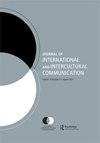了解你的历史:走向永远可替代的战略本质主义
IF 2.2
Q2 COMMUNICATION
Journal of International and Intercultural Communication
Pub Date : 2021-07-31
DOI:10.1080/17513057.2021.1957139
引用次数: 2
摘要
散居海外的酷儿非洲人经常重新审视被殖民主义掩盖的历史。在尼日利亚同性恋激进分子比西·阿里米(Bisi Alimi)颇具影响力的档案作品中,隐含着一种反殖民主义,但在战略上却是本质主义的主张,即为非洲同性恋民族争取历史地位。我提出“历史位置”和“(不)位置”来理解酷儿对历史建构的认同。战略本质主义的风险可以成为建立身份的认识论机会。我的分析首先追溯了战略本质主义是如何令人信服地构建历史位置的,然后探讨了(不)放置是如何扰乱非洲酷儿身份的认识论建构的。为了倡导对多样性的认识,我鼓励学者们把(错位)理解为一种复杂的白话话语策略,这种策略产生了归属感和反殖民想象的进一步可能性。本文章由计算机程序翻译,如有差异,请以英文原文为准。
Know your history: Toward an eternally displaceable strategic essentialism
ABSTRACT Queer Africans in diaspora often reclaim histories obscured by colonialism. Implicit in gay Nigerian activist Bisi Alimi’s influential archival work is an anti-colonial, but strategically essentialist, claim of a historical place for queer African peoples. I submit “historical place” and “(dis)placing” to understand queer disidentifications with historical construction. The risks of strategic essentialism can become epistemological opportunities for identity building. My analysis first traces how strategic essentialism persuasively constructs historical place and then explores how (dis)placing unsettles epistemological constructions of queer African identity. Advocating for a recognition of multiplicity, I encourage scholars to understand (dis)placing as complex vernacular discursive strategy that produces further possibilities for belonging and anti-colonial imagination.
求助全文
通过发布文献求助,成功后即可免费获取论文全文。
去求助
来源期刊

Journal of International and Intercultural Communication
COMMUNICATION-
CiteScore
3.80
自引率
12.50%
发文量
19
 求助内容:
求助内容: 应助结果提醒方式:
应助结果提醒方式:


